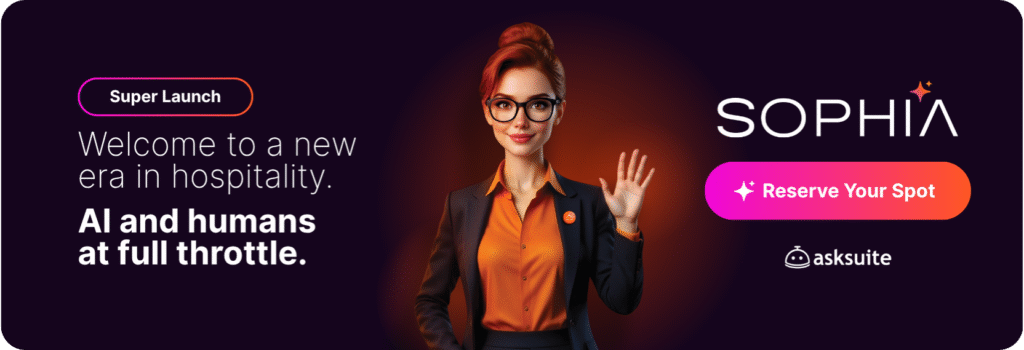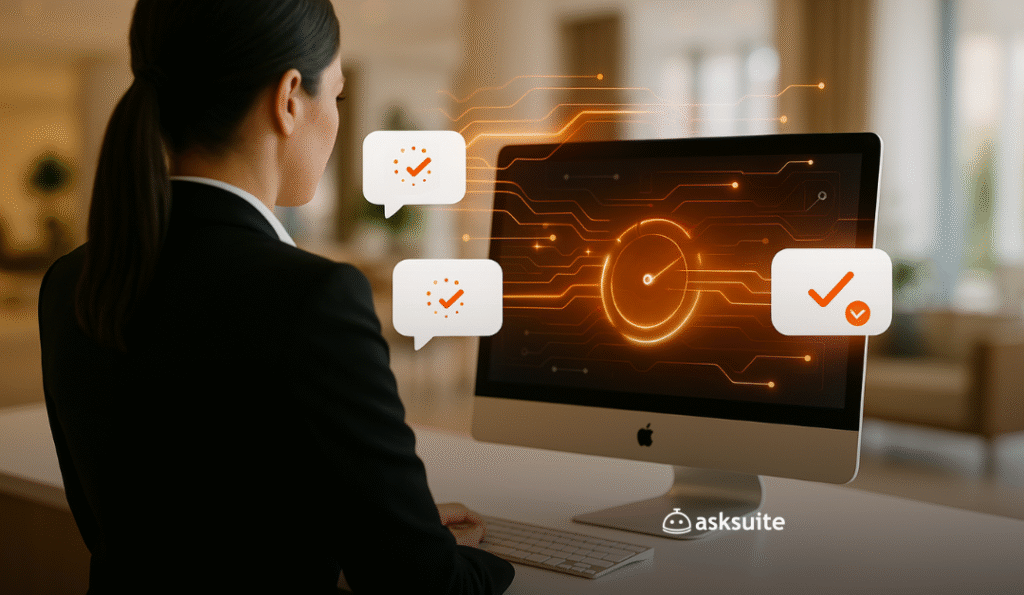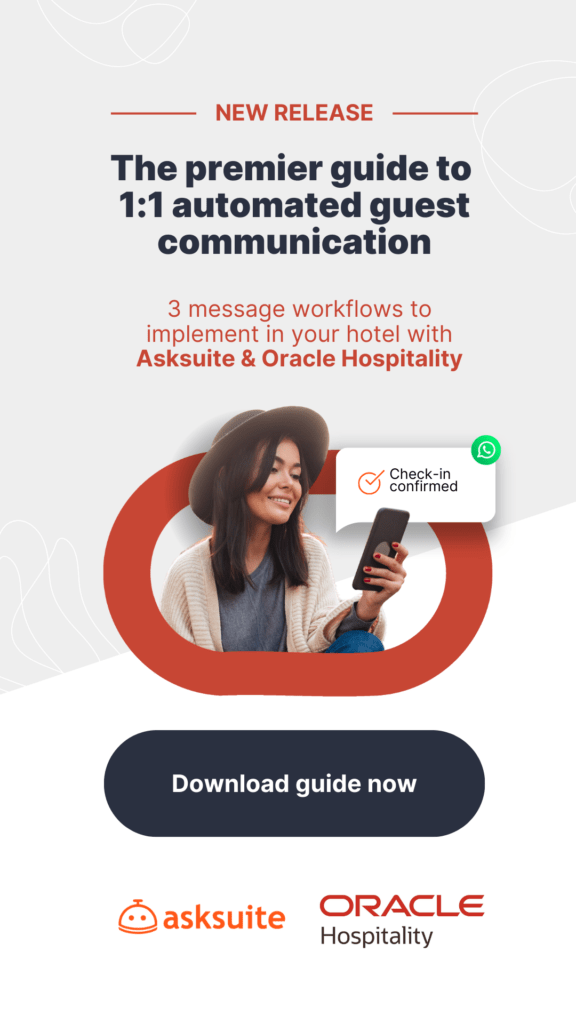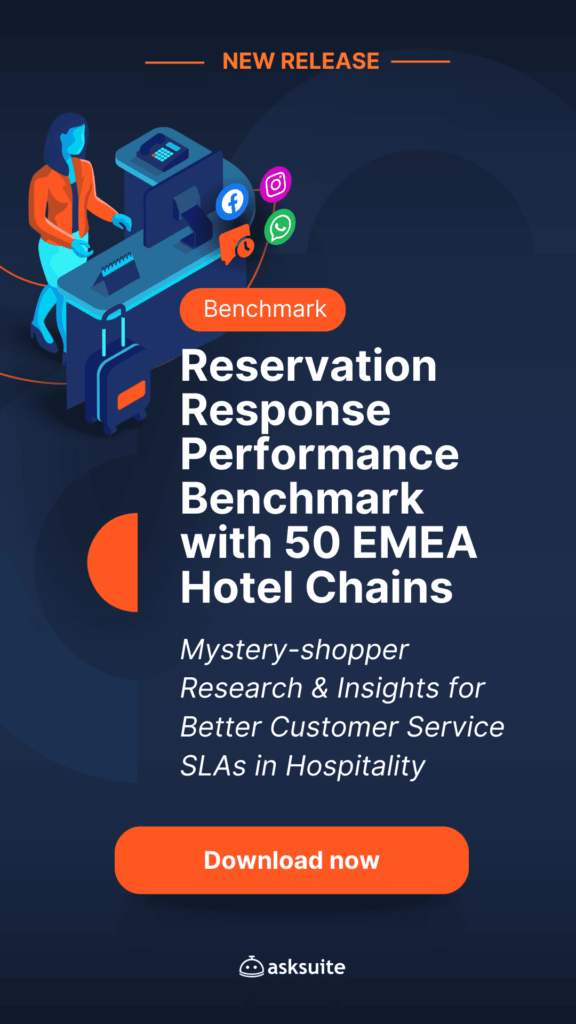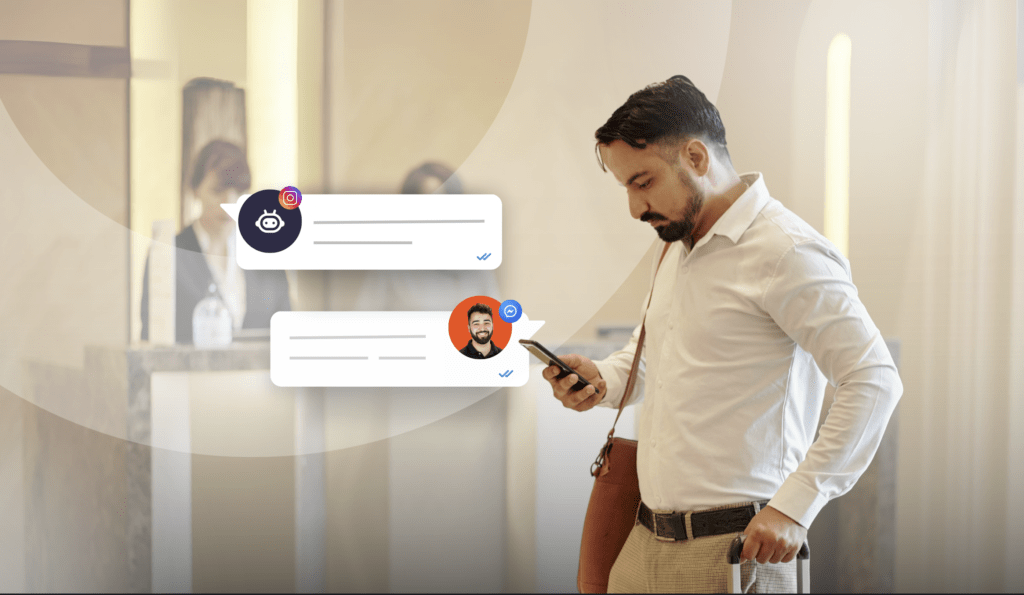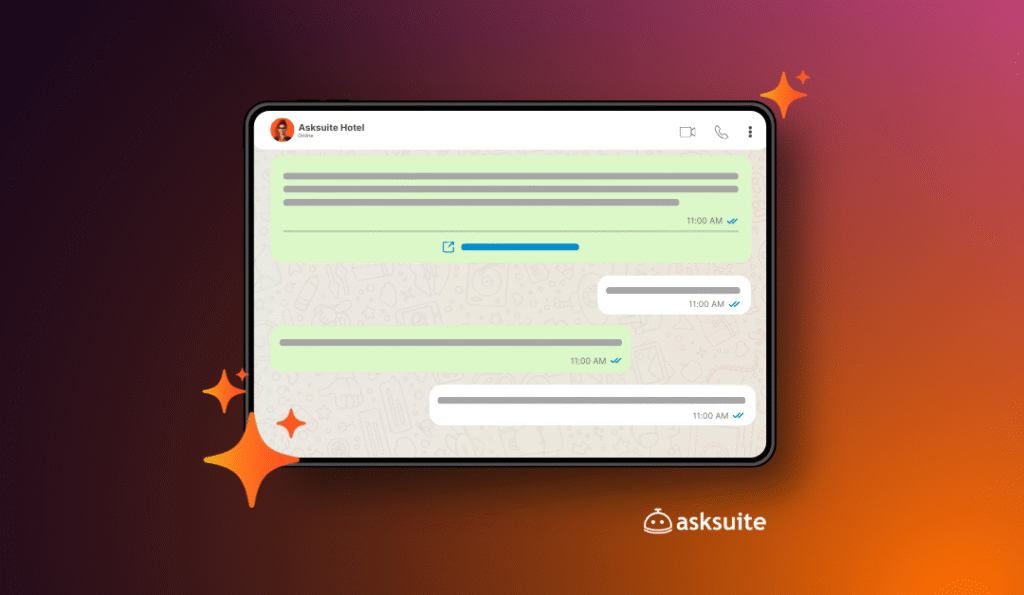Boost direct bookings, reduce workload, and elevate guest satisfaction with smart AI assistants tailored for modern hotels.
The hospitality industry is evolving rapidly, and guest expectations are rising just as fast. This is where AI agents in the hospitality industry come into play. According to the 2025 State of Hotel Guest Technology Report by Hotel Tech Report, 70% of guests find chatbots helpful for simple inquiries, and 58% say AI improves their hotel booking and stay experiences. For hotel operators, this presents a clear opportunity and challenge: how to deliver efficient, personalized service around the clock without overloading staff.
More than just chatbots, these intelligent systems transform guest engagement, such as answering routine questions, capturing leads outside business hours, and centralizing communication across channels. Beyond a tech upgrade, AI is a strategic driver for enhancing guest satisfaction, boosting operational efficiency, and increasing direct booking conversions.
What are AI Agents in the Hospitality Industry?
AI agents (a.k.a. AI assistants) are intelligent systems that automate traveler communication and streamline hotel operations. Using natural language processing (NLP) and machine learning, these technologies engage with potential guests in real time, offering accurate, context-aware responses that mimic human conversation.
Unlike traditional chatbots, which rely on rigid scripts and decision trees, modern AI hotel agents continuously learn from interactions. This means they can handle complex requests, understand traveler intent, and adapt to different communication styles, making them far more effective in delivering seamless service.
In a hotel setting, AI agents typically:
- Respond instantly to FAQs like check-in times, amenities, or cancellation policies.
- Provide real-time price quotes and direct links to the booking engine.
- Capture qualified leads for groups or events, even outside office hours.
- Re-engage travelers who abandoned their booking process.
- Offer multilingual support and consistent communication across web chat, WhatsApp, Instagram, Facebook Messenger, email, etc.
These capabilities are convenient and directly address major industry pain points: overworked staff, missed booking opportunities, and fragmented communication on multiple channels.
How Do AI Assistants Boost Direct Bookings and Revenue?
AI agents are powerful revenue enablers and can enhance direct bookings because they operate 24/7, engage website visitors, and take over non-sales tasks.
AI allows hotel teams to focus on what really matters: converting leads into bookings. Let’s break down the key ways AI drives direct revenue.
How do AI agents capture leads 24/7?
Travelers don’t follow business hours. Whether it’s 2 PM or 2 AM, AI agents are always available to respond instantly. They engage visitors in real time, capturing qualified leads for:
- Group and event bookings
- Long-stay inquiries
- Travelers who abandon carts mid-booking
Along with AI, automation tools like AskFlow can send follow-ups via WhatsApp, which reignites interest and entices potential guests back into the booking flow. The result? More opportunities, recovered revenue, and a steady stream of warm leads.
Is your reservation team still manually following-up with potential guests? Get to know AskFlow to maximize profits at your hotel!

How can AI improve conversion rates from website visitors?
AI agents enhance website performance by turning passive visitors into paying guests. According to Asksuite’s 1st Annual Report on Customer Service & AI in Hospitality, 75% of traveler interactions occur via website chat, and 45% of pre-stay conversations are focused on pricing. That’s a massive commercial window hoteliers can’t afford to miss.
AI instantly provides:
- Accurate price quotes
- Personalized recommendations
- Booking engine links tailored to user queries
This responsiveness drives action. In fact, AI-powered website chats have been shown to triple conversion rates compared to users who go directly to the booking engine without assistance. Combined with the convenience of multilingual support and 24/7 availability, AI eliminates booking friction, boosts traveler confidence, and reduces OTA dependence.
By proactively engaging visitors before they leave your site, AI becomes a digital concierge—and one of your most efficient sales assets.
How do AI agents free up human staff to focus on sales?
In hospitality, 55% of guest chats are not sales-related—they’re general questions like “Do you have parking?” or “Is breakfast included?”. These repetitive queries often overwhelm human agents, reducing their ability to focus on high-value conversations.
AI handles it all automatically, freeing up your team’s time for:
- Lead qualification
- Upselling
- Complex booking negotiations
This impact is measurable. Hotels using AI have successfully achieved:
- A 3:1 property-to-agent ratio
- A 50% automation of calls, emails, and social messages
- Significant increases in conversion and guest satisfaction

What is the Role of Omnichannel Communication with AI in Hospitality?
An omnichannel platform centralizes a hotel’s communication, which helps reservation agents respond faster and more efficiently,enhancing guest satisfaction even before a booking is completed.
Today’s travelers move seamlessly between platforms as they visit your website, send a WhatsApp message, then check Instagram DMs. If your hotel’s communication doesn’t follow them across these channels, crucial booking opportunities are at risk.
AI-powered omnichannel solutions ensure you never miss out.
Why is centralizing traveler interactions crucial?
With a unified inbox powered by AI, you ensure:
- Every interaction is logged and accessible across channels.
- Guests never have to repeat themselves.
- Agents get full conversation history to tailor responses in real time.
This eliminates fragmented communication, reduces errors, and creates a consistent brand experience,no matter how or where the guest reaches out.
According to Asksuite’s internal data, platforms like WhatsApp and Instagram combined account for nearly 30% of total guest interactions. An integrated view of all channels isn’t a nice-to-have—it’s essential for delivering responsive, reliable service at scale.
How does 24/7 multilingual support enhance traveler experience?
Travelers often reach out during non-business hours or in different languages. Without AI, you’d need an international team on call 24/7. With AI, you get instant, high-quality responses across time zones and languages, automatically.
Data from Asksuite’s report shows that 47% of customer service demand occurs outside business hours, and a large share of guests expect a fast response, regardless of when or where they are.
AI agents:
- Offer instant support in multiple languages.
- Detect user language automatically.
- Ensure service continuity during late nights, weekends, and holidays.
This improves satisfaction as well as prevents direct bookings from slipping through the cracks when your team is offline.
How to Implement and Optimize AI Agents for Your Hotel?
Introducing AI to your hotel’s communication strategy doesn’t have to be complicated. But it does need to be intentional. To unlock the full value of AI, hoteliers must think beyond the chatbot to ensure their tools are seamlessly integrated into their operational ecosystem.
What are the key integrations for effective AI implementation?
For AI to drive real results, it must plug into your hotel’s core systems. This means integrating with:
- Property Management Systems (PMS) to automate pre-arrival and post-stay messages.
- Booking engines for real-time availability and pricing.
- CRMs to personalize communication based on guest profiles and behavior.
These integrations allow the AI agent to:
- Automatically trigger messages (e.g., check-in instructions, upsells, loyalty offers).
- Provide accurate answers without staff involvement.
- Guide guests smoothly from inquiry to reservation confirmation.
An integrated setup guarantees that the AI is not operating in a silo as it’s fully embedded in your service infrastructure, making operations smarter, faster, and more guest-centric.
How can you leverage data and reports for continuous improvement?
The best AI solutions do more than answer questions, they deliver insights.
With real-time dashboards, like Asksuite’s SLA and Sales Performance Dashboards, hotel managers can:
- Monitor AI performance across all channels.
- Track conversion funnels and response rates.
- Identify opportunities to refine workflows and improve guest engagement.
Using this data, hoteliers can make informed decisions, shift resources where needed, and continuously test and improve the guest journey. From recognizing high-performing agents to spotting drop-offs in the booking process, AI-powered reporting makes your communication strategy measurable and scalable.
Need help integrating AI with your tech stack? Download the Hotel System Integration Checklist
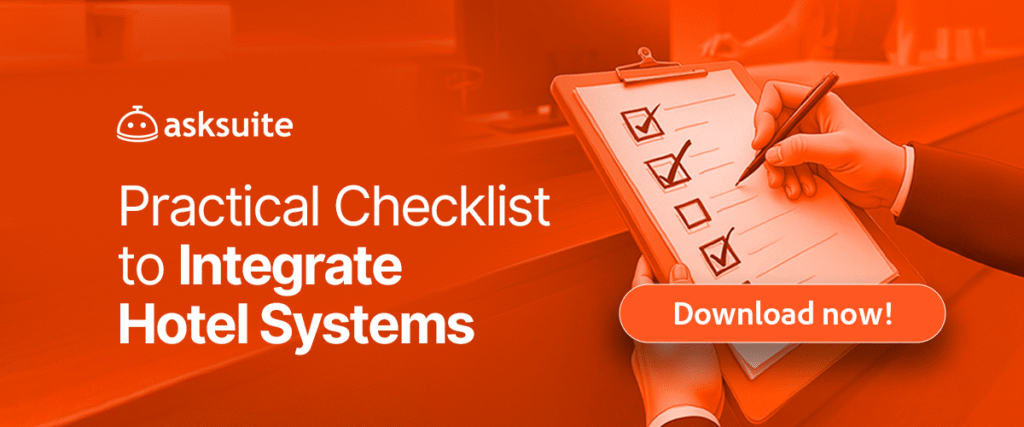
The Future of Hospitality: AI as a Strategic Partner
Artificial intelligence is not here to replace your hotel team, it’s here to empower it.
As we move deeper into the era of AI-first strategies, the hospitality sector is discovering that AI agents are far more than automation tools. They are strategic partners that enable hotels to scale personalized service, reduce operational friction, and boost revenue — all without compromising the guest experience.
When AI handles routine, repetitive, and time-sensitive interactions, human agents can focus on high-impact tasks: closing complex sales, nurturing guest relationships, and delivering standout experiences.
Looking ahead, AI will continue to evolve, offering even more personalized, proactive, and intelligent service. The next wave of innovation is already on the horizon.
The future belongs to hotels that view AI not just as a tool, but as a growth engine—one that’s capable of turning conversations into revenue, data into strategy, and service into loyalty.
Be among the first to experience the next generation of AI in hotels. Join the waitlist for Sophia — Coming soon!
